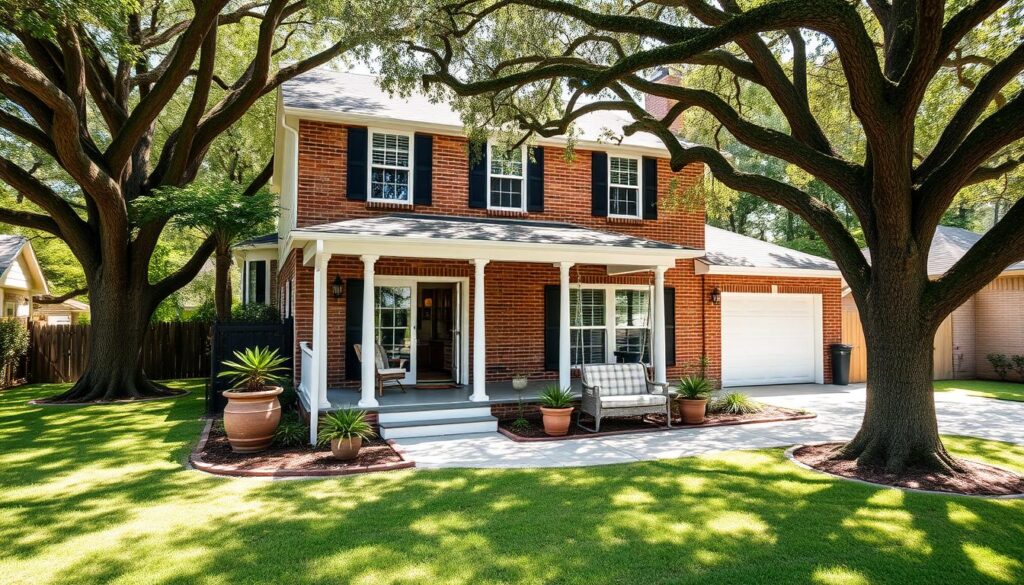Houston, TX, offers a thriving market for those considering a vacation property or investment. With its strong economy and coastal accessibility, the city attracts buyers seeking flexibility and long-term value. New Homes Houston Texas specializes in simplifying this journey, blending local expertise with personalized strategies. Whether you’re exploring financing or evaluating neighborhoods, their team provides trusted guidance. Reach out at (954) 821-4492 to start your journey today.
Purchasing a vacation property differs from acquiring a primary residence. Location priorities, usage plans, and financial considerations shift significantly. For example, Texas allows renting a secondary property for up to 180 days annually with conventional loans. This flexibility makes it ideal for part-time rentals or family retreats.
Current mortgage rates, like 6.375% APR for 30-year fixed loans, influence budgeting decisions. Credit scores matter too—lenders often require a minimum FICO score of 620. A 10% down payment is typical, though requirements vary based on financial profiles. Balancing these factors ensures a smoother process.
Key Takeaways
- Houston’s growing economy and coastal access make it a prime location for vacation properties.
- Secondary homes can be rented for up to 180 days per year with conventional financing.
- Mortgage options include competitive rates, such as 5.625% APR for FHA and VA loans.
- A 620+ credit score and 10% down payment are common requirements for lenders.
- Local expertise, like New Homes Houston Texas, helps navigate market trends and legal nuances.
Understanding the Benefits of a Second Home in Houston
Owning an additional residence in Houston unlocks opportunities beyond a typical real estate purchase. Whether you’re seeking a weekend escape or a strategic financial move, these properties offer flexibility most assets can’t match.

Vacation, Investment, or Family Use?
Houston’s diverse neighborhoods cater to varied goals. A coastal condo might serve as a personal retreat, while a downtown loft could generate rental income. Market data shows properties near employment hubs often appreciate faster, blending lifestyle perks with financial growth.
Renting your space part-time helps offset costs. Texas laws allow owners to lease for up to 180 days annually without reclassifying the property. This balance keeps options open—use it yourself during holidays or earn passive income otherwise.
Lifestyle and Long-Term Value
Beyond finances, a secondary residence enhances quality of life. Imagine hosting gatherings in a spacious backyard or enjoying cultural festivals minutes from your doorstep. As one local investor notes,
“Dual-purpose properties let you live richly today while building wealth for tomorrow.”
Equity growth and portfolio diversification add stability. Houston’s economy, driven by energy and healthcare sectors, supports steady appreciation. Pair this with tax deductions for mortgage interest, and the benefits multiply.
Assessing Your Financial Readiness for a Second Home
Securing a vacation property or investment home requires careful financial planning. Lenders scrutinize income stability, existing debts, and long-term affordability. Let’s break down key factors to evaluate before committing.

Budgeting Beyond the Purchase Price
Monthly mortgage payments are just one piece of the puzzle. Property taxes in Houston average 1.8% annually, while insurance costs often range from $1,200-$2,500 yearly. Maintenance adds another layer—experts recommend budgeting 1% of the home’s value annually for repairs.
Aim for a debt-to-income ratio below 36%. If your gross income is $8,000/month, total housing costs (including both properties) shouldn’t exceed $2,880. Emergency funds matter too—six months of expenses is the baseline for financial safety.
Strengthening Your Financial Profile
Most lenders require a 620+ credit score for second home loans. As one Houston mortgage advisor notes, “Borrowers with 740+ scores typically secure rates 0.5% lower than average.” Down payments start at 10%, but 15-20% improves approval odds and avoids mortgage insurance.
Preapproval clarifies your budget early. It reveals loan limits and identifies potential credit issues. Remember: rental income from the property can’t be counted toward qualification unless you have prior landlord experience.
Essential Steps on how to buy a second home
Strategic planning transforms complex processes into manageable actions. For those pursuing a dual-purpose residence, structured preparation ensures alignment with financial goals and lifestyle priorities.
Preapproval Process and House Hunting Strategies
Mortgage preapproval serves as your financial compass. Lenders review credit history, income stability, and debt ratios to determine borrowing limits. Tip: Compare multiple lenders—some offer down payment assistance programs in Texas. This step clarifies your budget and strengthens negotiation credibility.
Partnering with a real estate agent familiar with vacation properties streamlines searches. These professionals identify neighborhoods matching your criteria, from rental potential to accessibility. Prioritize properties meeting lender requirements, like single-unit dwellings suitable for year-round use.

Making an Offer and Negotiating
Crafting competitive offers requires market awareness. A local real estate agent provides insights into pricing trends and seller motivations. Consider including flexible closing dates or earnest money deposits to stand out.
Negotiation isn’t just about price. Discuss contingencies like inspection timelines or payment second home structures. As one Houston agent observes:
“Sellers value transparency—clear communication about financing readiness builds trust.”
Understanding the lender’s appraisal process helps avoid delays. Stay prepared to adjust terms while keeping long-term costs in focus.
Exploring Mortgage Options and Lender Requirements
Navigating mortgage options for a vacation property requires understanding key differences between loan products. Lenders evaluate applications through unique lenses, prioritizing financial stability and risk management.
Understanding Conventional and Jumbo Loans
Conventional loans suit most buyers, requiring a 640+ credit score and 10-20% down payment. These follow limits set by Fannie Mae and Freddie Mac—$726,200 in Houston for 2023. Jumbo loans finance pricier properties but demand stricter criteria: 700+ scores and 20-30% down.
| Loan Type | Credit Minimum | Down Payment | Loan Limit |
|---|---|---|---|
| Conventional | 640 | 10-20% | $726,200 |
| Jumbo | 700 | 20-30% | Above $726,200 |
Cash reserves matter too. Most lenders require 2-6 months of payments saved. As one Houston loan officer notes:
“Borrowers with 740+ scores often secure rates 0.25% below average—saving thousands over the loan term.”
Qualifying for Competitive Rates
Rates depend on credit history, debt-to-income ratios, and down payment size. Improving your profile involves:
- Paying down existing debts before applying
- Avoiding new credit inquiries for 6 months pre-application
- Providing thorough income documentation
Top Texas lenders like Rocket Mortgage and Chase offer conventional loans starting at 6.5% APR for well-qualified buyers. Comparing multiple lenders ensures you find terms aligning with your financial roadmap.
Evaluating the Costs of Owning a Second Home
Recurring expenses determine whether an additional property remains an asset or becomes a financial burden. Careful budgeting for ongoing obligations ensures sustainable ownership.
Insurance, Utilities, and Maintenance Costs
Secondary residences often carry 15-30% higher insurance premiums than primary homes. Houston properties near flood zones may require supplemental coverage. Annual premiums average $1,800-$3,500 depending on location and amenities.
| Expense Category | Average Monthly Cost | Key Considerations |
|---|---|---|
| Homeowners Insurance | $150-$290 | Flood coverage adds $700-$2k/year |
| Utilities | $120-$400 | Includes security system monitoring |
Vacant properties still incur 40-60% of typical utility costs. A local property manager notes:
“Landscaping and HVAC maintenance account for 35% of service calls on unused homes.”
Seasonal repairs and pest control add unpredictability. Experts recommend setting aside $200-$500 monthly for:
- Roof inspections
- Pool maintenance
- Exterior painting cycles
Building cash reserves equivalent to six months of expenses helps manage emergencies. Tracking these costs through budgeting apps creates awareness of spending patterns over time.
Location Analysis: Why Houston, TX Is Ideal

Houston’s economic resilience continues attracting property investors and seasonal residents alike. Over 557,000 jobs were added from 2020-2023, with another 57,600 projected this year. This growth fuels demand for diverse housing options while maintaining affordability.
Local Market Trends and Economic Factors
The median home price sits at $325,000—20% below the national average. Properties in neighborhoods like Gulfgate/Riverview saw values rise 8% last year, outpacing many U.S. markets. Inventory levels increased 30% since 2023, giving buyers more negotiating power.
| Metric | Houston | National Average |
|---|---|---|
| Median Home Price | $325,000 | $407,500 |
| Job Growth (2024) | +2.1% | +1.5% |
| Active Listings | 3.3 months supply | 2.9 months |
Luxury properties tell a compelling story—sales over $1 million jumped 20.7% last year. As one local realtor observes:
“Investors target areas near Texas Medical Center and Energy Corridor, where properties appreciate 3-5% annually.”
Current timing favors buyers. Mortgage rates dipped to 6.6%, with forecasts suggesting mid-6% ranges through 2024. Combined with Houston’s 7.5% lower living costs than national averages, this creates strategic entry points.
Leveraging Equity and Advanced Financing Strategies
Smart financing strategies can transform existing home equity into opportunities for acquiring additional properties. Homeowners often overlook the potential of their primary residence’s value to fund new ventures. Tools like cash-out refinancing or HELOCs provide flexible pathways to access these resources while maintaining ownership.

Using Cash-out Refinance or HELOC
A cash-out refinance replaces your current mortgage with a larger loan, letting you pocket the difference. For example, a homeowner with $500,000 in equity might refinance to borrow $300,000. This lump sum could cover a 20% down payment on a $1.5 million property.
| Option | Key Features | Best For |
|---|---|---|
| Cash-Out Refinance | Fixed rates, lump-sum payment | Long-term stability |
| HELOC | Variable rates, flexible withdrawals | Short-term needs |
HELOCs act like credit cards, allowing repeated borrowing up to a limit. Both options require 15-20% equity retention in your primary home. Risks include higher monthly payments and potential foreclosure if terms aren’t met.
Benefits of Partnering with Local Experts
Local advisors understand Houston’s unique market dynamics. They identify tax implications, zoning laws, and neighborhood trends affecting investment properties. One financial planner notes:
“Tailored strategies prevent over-leveraging while aligning with growth opportunities.”
These professionals also negotiate competitive rates and explain long-term impacts. For instance, using equity for investment properties might limit mortgage interest deductions. Balancing risks and rewards ensures decisions support 5-10 year financial goals.
Additional Tips and Considerations for Buyers
Balancing personal enjoyment with financial strategy elevates the value of a vacation residence. Thoughtful planning ensures your property serves multiple purposes while avoiding common pitfalls.

Tax Strategies and Portfolio Integration
Owners who rent their residence for over 14 days annually face different tax classifications. Mortgage interest deductions apply if personal use exceeds 50% of rental days. A tax professional can identify write-offs like maintenance costs or depreciation.
| Scenario | Tax Benefit | Requirement |
|---|---|---|
| Personal Use | Mortgage interest deduction | 14+ personal days/year |
| Rental Property | Expense deductions | IRS Schedule E filing |
Local regulations, like Houston’s short-term rental permits, influence management decisions. One property manager advises:
“Automate utility payments and schedule seasonal inspections to reduce vacancy risks.”
Seasonal rentals in high-demand areas often yield 15-25% annual returns. However, budget for advertising fees and cleaning services—these eat into profits. Partnering with an estate agent familiar with rental markets ensures accurate pricing and tenant screening.
Integrate the property into your portfolio by tracking appreciation rates and equity growth. Houston’s 3-5% annual value increases complement stock market investments. Regular reviews with financial advisors keep goals aligned.
Conclusion
Exploring investment properties in Houston combines financial foresight with lifestyle enrichment. Strategic steps—from evaluating credit scores to analyzing financing options—lay the groundwork for sustainable ownership. Houston’s thriving job market and diverse neighborhoods create opportunities for both personal use and rental income potential.
Understanding costs like insurance premiums and maintenance ensures informed decisions. Local experts, including seasoned real estate agents, provide insights into market trends and tax strategies. Their guidance helps balance equity growth with practical considerations like cash reserves.
Houston stands out for its affordability and economic resilience. Properties here serve dual purposes: enriching your daily life while strengthening your portfolio. Whether seeking a family retreat or long-term appreciation, the city offers flexibility unmatched in many markets.
Ready to take the next step? Connect with New Homes Houston Texas at (954) 821-4492. Their team tailors solutions to your goals, ensuring a seamless journey toward owning a valuable asset. Start building your future today—Houston’s opportunities await.
FAQ
What credit score is needed to finance a second home in Houston?
Can rental income from a second property help qualify for a loan?
How do property taxes differ for second homes in Texas?
Are there special insurance requirements for Houston-area vacation homes?
What credit score is needed to finance a second home in Houston?
Can rental income from a second property help qualify for a loan?
How do property taxes differ for second homes in Texas?
Are there special insurance requirements for Houston-area vacation homes?
FAQ
What credit score is needed to finance a second home in Houston?
Most lenders require a minimum 620–680 credit score for second home mortgages. Conventional loans often demand higher scores (700+) for competitive rates, while jumbo loans may require 720+. Credit history and debt-to-income ratios also impact approval.
Can rental income from a second property help qualify for a loan?
Lenders typically require a 1–2 year rental history to count rental income toward qualification. For new investment properties, only personal income sources are considered. Consult lenders like Rocket Mortgage or local banks for specific guidelines.
How do property taxes differ for second homes in Texas?
Texas has no state income tax, but property taxes average 1.6–2.3% of assessed value. Second homes don’t qualify for homestead exemptions, potentially increasing annual costs by ,000–,000 compared to primary residences.
Are there special insurance requirements for Houston-area vacation homes?
Flood insurance is often mandatory in Houston zones like Meyerland or Kingwood. Policies average 0–,500/year. Windstorm coverage and higher liability limits (up to
FAQ
What credit score is needed to finance a second home in Houston?
Most lenders require a minimum 620–680 credit score for second home mortgages. Conventional loans often demand higher scores (700+) for competitive rates, while jumbo loans may require 720+. Credit history and debt-to-income ratios also impact approval.
Can rental income from a second property help qualify for a loan?
Lenders typically require a 1–2 year rental history to count rental income toward qualification. For new investment properties, only personal income sources are considered. Consult lenders like Rocket Mortgage or local banks for specific guidelines.
How do property taxes differ for second homes in Texas?
Texas has no state income tax, but property taxes average 1.6–2.3% of assessed value. Second homes don’t qualify for homestead exemptions, potentially increasing annual costs by $3,000–$8,000 compared to primary residences.
Are there special insurance requirements for Houston-area vacation homes?
Flood insurance is often mandatory in Houston zones like Meyerland or Kingwood. Policies average $700–$2,500/year. Windstorm coverage and higher liability limits (up to $1M) are recommended for rental properties.
What’s the minimum down payment for investment properties vs vacation homes?
Vacation homes require 10–20% down, while investment properties need 15–25%. Portfolio loans through institutions like BBVA or Wells Fargo may offer 10% down options for qualified buyers with strong assets.
How does Houston’s market stability affect long-term investment potential?
Houston’s diversified economy and population growth (6.7% since 2020) support steady 3–5% annual appreciation. Neighborhoods like The Woodlands and Katy offer strong rental demand, with 8–12% gross yields on well-priced properties.
Can I use equity from my primary residence to buy a second home?
Yes. A cash-out refinance or HELOC from providers like Chase or Frost Bank allows accessing up to 80–90% of your primary home’s equity. Rates for HELOCs currently range from 7.5–9.25% APR.
What tax deductions apply to second homes used part-time as rentals?
If rented ≤14 days annually, income is tax-free. For longer rentals, mortgage interest and operating expenses become deductible. Always consult a CPA – rules vary based on personal vs rental use percentages.
M) are recommended for rental properties.
What’s the minimum down payment for investment properties vs vacation homes?
Vacation homes require 10–20% down, while investment properties need 15–25%. Portfolio loans through institutions like BBVA or Wells Fargo may offer 10% down options for qualified buyers with strong assets.
How does Houston’s market stability affect long-term investment potential?
Houston’s diversified economy and population growth (6.7% since 2020) support steady 3–5% annual appreciation. Neighborhoods like The Woodlands and Katy offer strong rental demand, with 8–12% gross yields on well-priced properties.
Can I use equity from my primary residence to buy a second home?
Yes. A cash-out refinance or HELOC from providers like Chase or Frost Bank allows accessing up to 80–90% of your primary home’s equity. Rates for HELOCs currently range from 7.5–9.25% APR.
What tax deductions apply to second homes used part-time as rentals?
If rented ≤14 days annually, income is tax-free. For longer rentals, mortgage interest and operating expenses become deductible. Always consult a CPA – rules vary based on personal vs rental use percentages.





